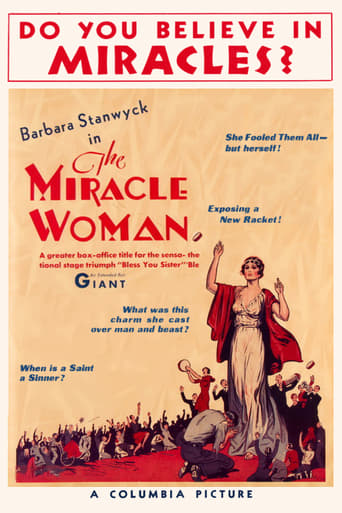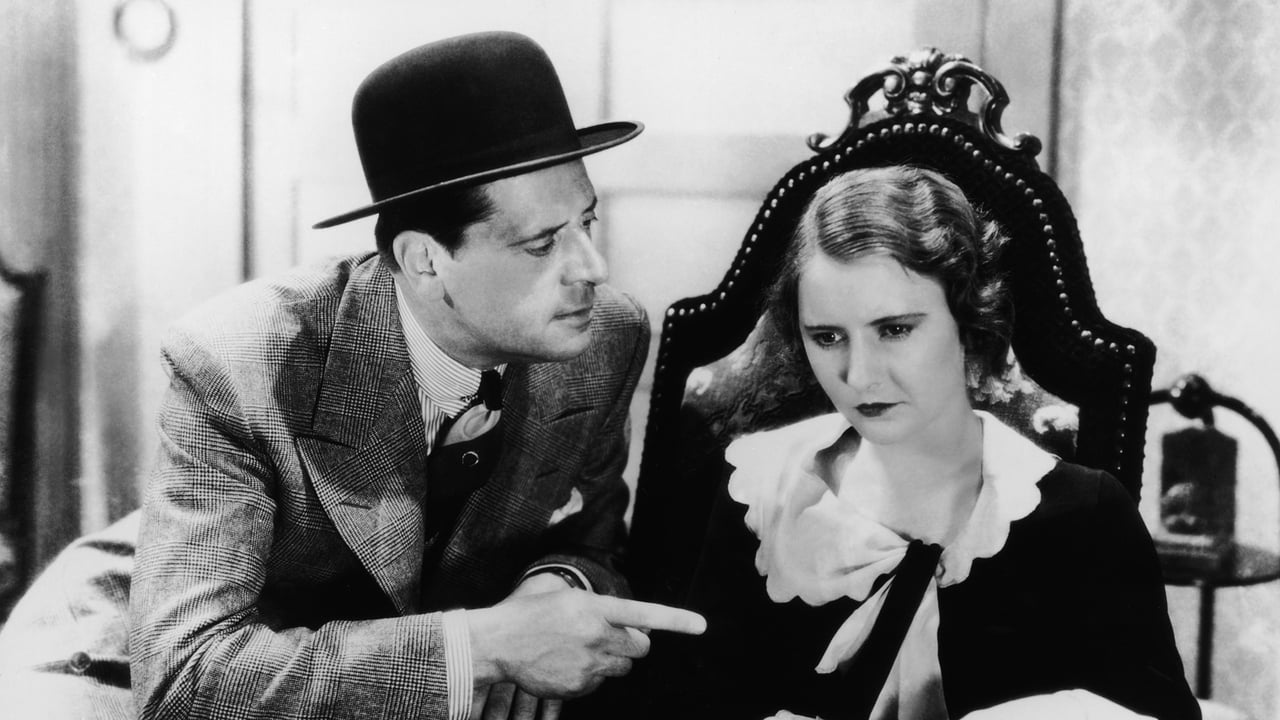Steffi_P
In Hollywood's classic age Columbia Studios was infamously dubbed "poverty row", because of its low budget prodcutions and lack of star power. However it did prove itself a fertile ground for talent and a lot of up-and-comers who would later be big names got their first break there. Such a one was Barbara Stanwyck, here on the ascendant as The Miracle Woman.Unlike most of the bigger studios, Columbia's biggest asset during the 1930s was not a star but a director. Just like Stanwyck, Frank Capra was just starting to make a name for himself. For The Miracle Woman Capra demonstrates his increasingly passive camera positioning, often putting us audience members in the place of observer amid the crowd, which is rather appropriate for this picture all about display and performance. Capra still has something of the naïve show-off about him however, and there are quite a few attention-grabbing whip-pans and "impossible" shots like the one staring up through the fireplace, which don't really add a lot. And Capra's camera perhaps hangs back a bit too much, making the romantic scenes a little cold. Perhaps this picture of one-on-one relationships is not really suited to him. Capra really came into his own when dealing with groups, families and communities.Ms Stanwyck however barely has any need of a decent director, being absolutely able to command our attention when she is on the screen. Her standout scene is actually her first, when she vehemently addresses a congregation after the death of her father. She manages the difficult task of being passionately enraged, for a good few minutes, without becoming hysterical, a particular rarity in this age of hammier acting. And throughout the picture she proves herself to be deep and subtle with her emotion, with a performance that is convincing and totally absorbing. Unfortunately the same cannot quite be said of her co-stars. David Manners was fairly popular at the time, and he was pretty good in the somewhat phoney world of Dracula (1931), but here he is rather wooden. He's certainly a good ventriloquist, but his ventriloquism act seems to have been shoehorned into the plot simply because it was something he could do. He doesn't really convince as a blind man either, more than once making eye contact with Stanwyck or obviously seeing his way around the set.And apart from Stanwyck's performance there is very little to recommend about The Miracle Woman. The plot is a second-rate rip-off of Sinclair Lewis's novel Elmer Gantry (which, incidentally, was so controversial it was not filmed until 1960) and while the very competent Jo Swerling has adapted the John Meehan/Robert Riskin* play lucidly for the screen, it remains a rather lacklustre affair. There is some potential for pathos, but sadly the script is not lively enough to bring it out. Yet amid it Stanwyck stands out like a fiery beacon, and the picture is just about worth seeing for her alone. Hollywood honchos would be taking note as well, and the young actress would soon be bound for big roles at the major studios.*Later a crucial yet unsung Capra collaborator, Riskin would write some of the finest screenplays of the 1930s. We can only assume that his ability was not fully fledged at the time he was writing The Miracle Woman, which is supported by the fact that he and Meehan chose to steal most of their plot from a popular novel of the day rather than coming up with something original. Nevertheless Riskin would soon go on to great things, and he deserves this footnote by way of a disclaimer. Oh, and John Meehan later did some pretty good screenplays too.
calvinnme
Many of Capra's films point out the nobility of small town America, but here he seems to be doing just the opposite - bringing to light how one small town has just fired their preacher for the unpardonable sin of aging and hired a younger man to replace him without a backwards glance to the consequences to the displaced older man. The old preacher dies dictating his last sermon. We don't see this but we hear it from his daughter Florence played by Barbara Stanwyck. The farewell sermon she gives the parishioners has them walking out - or should I say running - as she calls them murderers, thieves, adulterers, closet drunks - being the preacher's daughter she knows where the bodies are buried and she tells them. A con man is in the congregation for some reason and he says if she wants to get even - and rich - she should run a faith healing con on this same type of small town hypocrite. The world is full of them according to her mentor. The plan works - Florence is as fiery as a fake preacher as she was as a real one and soon the two are rolling in dough with the help of lots of paid fakers. What makes it easy is that the crowd seems to be there for a circus more than a sermon and they do certainly get their money's worth and ask no questions. However, Florence soon has double trouble on her hands. It turns out that her mentor has a darker side than she figured on who keeps her on a very short leash, and then there is the appearance into her life of a man who was blinded in WWI - David Manners as John, a failed songwriter, who claims one of her radio sermons kept him from jumping from his high rise apartment window to his death.What is good about this film? Stanwyck of course. Just a couple of years after sound came into films the lady is fire and ice with the spoken word. Plus even in these early films Capra is visiting the themes of depression, class warfare, suicide, the forgotten man, the power of the individual, and the madness and fickleness of the mob - all which show up in his later efforts.What holds the film back is the rather unexplained relationship between Manners' and Stanwyck's characters. There just doesn't seem to be any reason for them to be together other than that each would be completely alone in the world as far as human comfort goes without the other due to their isolated existences. In spite of that, their relationship and scenes together are believable.Overall, this film does a good job of exploring the fact that for those who lose their faith, it's usually not God that's hard to love but rather the people He created due to their overall indifference towards anything outside of their own little world.
Michael_Elliott
Miracle Woman, The (1931) *** (out of 4) Frank Capra's controversial film was a box office dud back in the day and was slightly telling the story of the controversial evangelist Aimee Semple McPherson. In the film, Barbara Stanwyck plays a woman who's faith in God turns after her father, a preacher, is thrown out of his church by a bunch of hypocrites. Not knowing where to turn after her fathers death, the woman takes on a manager and the two begin to cheat churchgoers with fake heelings. Everything, including the money, is going strong until the young woman meets a blind man (David Manners) and the two fall in love. This is a rather strange film and it's easy to see why it would bomb back in the day but today is speaks quite strongly about faith and religion. The opening sequence with Stanwyck screaming at those who threw her father out are very strong and features Stanwyck at the best I've seen her. I'm not a fan of the actress but she really blew my mind here with her very strong and heartfelt performance. Manner is equally wonderful in his role as the blind man and he does a very good job at playing blind. Capra's direction is very strong throughout, especially the ending.
Ursula 2.7T
Thank goodness for Turner Classic Movies! I see the best movies on this channel. The Miracle Woman was amazing, and far better than 99% of our modern movies!Stanwyck is awesome as a disillusioned preacher's daughter who falls prey to a con-man who sets up a phony church with "Sister Fallon" (Stanwyck) as the main preacher. At first Stanwyck is OK with this set-up, as she's bitter towards the hypocritical church-goers at her father's church where he died. But, her conscious eventually gets to her and she wants to get out of the racket. Her boss, a bad guy well-played by Sam Hardy, threatens her with jail if she tries to leave -- you see, he's managed to put everything in her name, so at the very least she could go to jail for fraud and perhaps even murder (the boss murdered the accountant but has "evidence" that links Stanwyck to it).Along the way, Stanwyck has fallen in love with David Manners, who plays a blind ex-aviator. Her love for him was quite touching and believable, however I found Manners's character rather one-dimensional and not very compelling. Nonetheless, that did not detract from the story and I was rooting for Stanwyck and Manners to end up together (such was the power of Stanwyck's performance).One final note, not really a spoiler but more of an interesting trivia point: In one scene, the boss issued a thinly veiled threat to Stanwyck's chauffeur and asked the chauffeur if he got his drift. The chauffeur said yes, then walked out of the office and closed the door. Then, from behind the closed door, we see what the chauffeur really thinks of the boss: the chauffeur FLIPPED OFF the boss and said "and your black derby too" (the boss was wearing a black derby). I nearly fell out of my chair and had to rewind the Tivo a few times to make sure my eyes were not deceiving me. I don't think I've ever seen someone flip someone off (this was a full-on middle finger flip-off) in a movie prior to say the 1970s or maybe even the 1980s. Then I remembered this was a 1931 movie -- 3 years before the Production Code went into full-force effect. It was just a tiny moment in this fantastic movie, but I loved the heck out of it! By the way, I'm normally not a Frank Capra fan, but I found this to be a very good movie of his. Towards the end of the movie it appears that it will end quite tragically, and being that this was 1931 I was afraid it might. (Happy endings are a trademark of the post-Code days, not the pre-Code days.) A tiny part of me was rooting for Frank Capra to pull off one of his usual post-Code feel-good endings ... you'll have to watch the movie to see how it ended.I easily give this a 9/10!



 AD
AD


